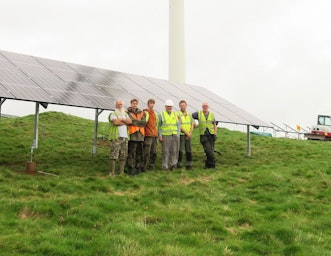
Dr Anna Bullen, Innovation Lab Manager, explains how a collaboration between CAT and Aberystwyth University is finding new ways to communicate about the climate and biodiversity crises.
CAT has recently been part of a collaborative partnership with Aberystwyth University through a Natural Environment Research Council (NERC) funded project called ‘Discipline Hopping’. This project has seen five eminent poets from the university being immersed in life at CAT, with a view to understanding more about the climate and biodiversity emergencies and translating what they learn into a series of poems.
Activities have included: three immersive tours of the CAT site, focusing on biodiversity and water; a practical building workshop, in which the poets learned to make earth bricks; attendance at lectures delivered by staff from our Graduate School of the Environment; and a bespoke Zero Carbon Britain training session.
Following this, through facilitated deep-dive conversations, the poets explored their interests and identified specific areas that they would focus on for their poetry. Through one-to-one conversations with CAT’s experts in those areas, they explored the topics in greater depth and expanded their knowledge and understanding.
On 7 April, the poets delivered a poetry recital to students and staff at CAT. Next, the poems will be displayed at our visitor centre and we hope to create a book of the poems.
We would like to express our thanks to all the poets – Professor Matthew Jarvis, Professor Mererid Hopwood, Mr Eurig Salisbury, Dr Hywel Griffiths, and Dr Gavin Goodwin – for embracing this work with such vigour and passion and then sharing the results with us.
Mererid Hopwood is one of the poets taking part in the project. Here are some words from her on the experience.
“Stepping into the CAT courtyard that morning in February, the senses were on high alert. Sounds, in particular, were demanding attention. The wind carried invisible rain, the clouds invisible fighterjet-planes and the streams ran over their own invisible banks. It’s well-known that we use ‘clywed’, our Welsh word for ‘to hear’, when we sense touch, taste and smell as well as sound. Perhaps it’s little wonder then, that what I heard, and didn’t hear, on that visit is what has stayed with me more than anything.
The discussion with the CAT team as we ‘hopped’ between the disciplines of literature and alternative technology, was, I feel sure, a rich prelude. There is much more to share and to learn. I think we all felt that. It has led me to a half poem about the ‘clawdd’, that vibrant place between two fields. But until that’s ready, here’s an englyn from our first visit. It suggests how we might recall the summer to the earth and the plants to life by giving them back their native names.
Mererid Hopwood is one of the poets taking part in the project. Here are some words from her on the experience.
A’u hen enwau dihunaf – dawelwch
y dail nes y’u clywaf,
a’u galw hyd nes gwelaf
yn y tir hwn eto’r haf.
Diolch o galon am gael bod yn rhan o gynllun mor gyffrous.
[Thank you so much for being part of such an exciting scheme.]”
Mererid
- Zero Carbon Britain
- Climate Change
- Nature and Wildlife
- News Feed
Related Topics
Related Pages
Related news


Why we teach… community solar
9th April 2024
Scaling up climate action in your community
12th February 2024
COP28 – critical steps, but much further to go before we reach safer ground
18th December 2023EMAIL SIGN UP
Keep up to date with all the latest activities, events and online resources by signing up to our emails and following us on social media. And if you'd like to get involved and support our work, we'd love to welcome you as a CAT member.

